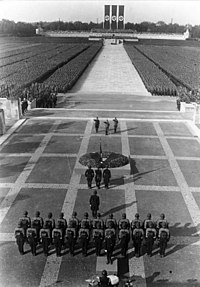
Back النازية والسينما Arabic Nationalsozialistische Filmpolitik German Nazismo en el cine Spanish Cinéma sous le Troisième Reich French נאציזם וקולנוע HE Nazisme dan sinema ID Cinema nel Terzo Reich Italian ナチスの映画政策 Japanese Kinematografia III Rzeszy Polish Cinema na Alemanha Nazista Portuguese

Nazism made extensive use of the cinema throughout its history. Though it was a relatively new technology, the Nazi Party established a film department soon after it rose to power in Germany. Both Adolf Hitler and his propaganda minister, Joseph Goebbels, used the many Nazi films to promote the party ideology and show their influence in the burgeoning art form, which was an object of personal fascination for Hitler.[1] The Nazis valued film as a propaganda instrument of enormous power, courting the masses by means of slogans that were aimed directly at the instincts and emotions of the people. The Department of Film also used the economic power of German moviegoers to influence the international film market. This resulted in almost all Hollywood producers censoring films critical of Nazism during the 1930s, as well as showing news shorts produced by the Nazis in American theaters.